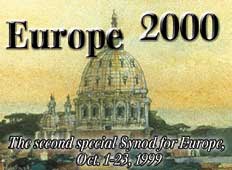

 |
 |
|
|
Pope names three women patrons; bishops see a troubled Europe By JOHN L. ALLEN JR.
In what may have been a preemptive strike against criticism of the church as hostile to women, John Paul II opened the second European synod this decade by designating three new female patrons for the continent: Saints Edith Stein, Catherine of Siena, and Bridget of Sweden. The pope said he chose the three “in order to highlight the important role women had and still have in the ecclesiastical and lay history of the continent up to our day.” “From her origins, the church, though being conditioned by the cultures in which she finds herself, has always acknowledged the full spiritual dignity of women,” the pope said in the halting, slurred speech that has become familiar from the 79 year-old pontiff. The line brought applause from the crowd in St. Peter’s. The announcement came in the opening Mass for the synod in St. Peter’s Basilica Oct. 1. The first gathering of European bishops took place in 1991, in the immediate aftermath of the fall of communism. The three female saints join St. Benedict, representing Western Europe, and Sts. Cyril and Methodius, apostles of the Slavic East, as continental patrons. A Jewish convert and Carmelite nun who died in Auschwitz in 1942, Stein was offered by the pope as a “symbol of the dramas of Europe this century.” Catherine and Bridget, both active in the 14th century, showed concern for the church “on a European scale,” John Paul said. The new spotlight on Stein may revive criticism from Jewish groups that earlier objected to her canonization, arguing that Stein’s martyrdom came as a Jew, not a Catholic. The Vatican has defended the move on the grounds that her deportation to Auschwitz resulted from opposition to the Nazi regime by the Dutch Catholic church. Though John Paul did not note the irony, each of the three new female patrons acted as goads and critics of popes of their era. Stein sent a letter to Pope Pius XI in 1933, asking for an audience to urge a papal condemnation of fascism. The meeting never took place, and Stein later expressed deep disappointment. (www.geocities.com/Wellesley/1561/stein.html). A third order Dominican, Catherine demanded that Pope Gregory XI end the so-called Babylonian Captivity of the papacy in France by returning to Rome, at one pointing telling him to “act like a man.” (www.op.org/domcentral/trad/cathlinks.htm) Bridget communicated mystical visions to several popes, warning that Christ would condemn them if they did not carry out reforms. She once told Clement V that his sins made him “worse than Lucifer.” (www.fordham.edu/halsall/basis/bridget-tractatus.html) Given the often fierce criticism of this papacy on women’s issues - especially the question of female priests - some observers believe John Paul’s elevation of these three figures could inadvertently offer consolation to disaffected Catholic women today. Europe may be unique with its six official patrons, but judging by the opening statements of this synod it would appear that they have plenty of work to do. Preparatory documents warned of a “paganisation of the continent,” and several opening speakers echoed that bleak view. Spanish Cardinal María Rouco Varela, the synod’s relator - a position akin to chairman -- said in his opening address that the dominant ideology in Europe is “immanent humanism,” the attitude that humanity’s salvation will come from inner-worldly forces. Such an ideology was the basis of Marxism in Eastern Europe, just as it undergirds liberalism in the West, Rouco said. This immanent humanism has infiltrated the church in the guise of secularization, Rouco said. Christianity has become for many merely a “strategy for better organizing the things of this world,” stripped of its transcendent faith in resurrection and eternal life. Such a horizontal re-interpretation is unacceptable, the 63-year-old cardinal from Madrid said: “So-called ‘orthopraxy’ is not possible without true orthodoxy.” Rouco affirmed the “new ecclesial movements” such as Focolare (www.rc.net/focolare/), Communion and Liberation (www.comunioneliberazione.org/), and the Neocatechumenate (www.christusrex.org/www2/ncw/). The movements were a theme throughout the opening speeches of the synod (called “interventions”), especially in the remarks of Cardinal Miloslav Vlk of Prague, himself a Focolare member. “Through these forces, the Holy Spirit is giving the people of God a new face, new dynamism, and new vitality,” Vlk told the assembly. Both Rouco Varela and Vlk are considered by some to be among the papabile, or possible candidates for pope. Both, however, have liabilities: Rouco Varela because at 63 he is relatively young, and Vlk because he is from Eastern Europe. On the theory that the next conclave will want someone different from the Karol Wojtyla they elected in 1978, an older man from another region of the world would better fit the profile. Despite the opening gesture from the pope, none of the bishops in the first round of speeches said anything about women. At the synod’s first press conference, however, Italian journalist Marco Politi pointed out that while the male heads of religious congregations are voting synod members, women are not. How, he asked, could the bishops expect credibility in such a context? Rouco Varela’s response was to the point: women superiors are present as advisors, but they are not ordinary members of the synod like men - because they are not ordained. National Catholic Reporter, October 4, 1999 |